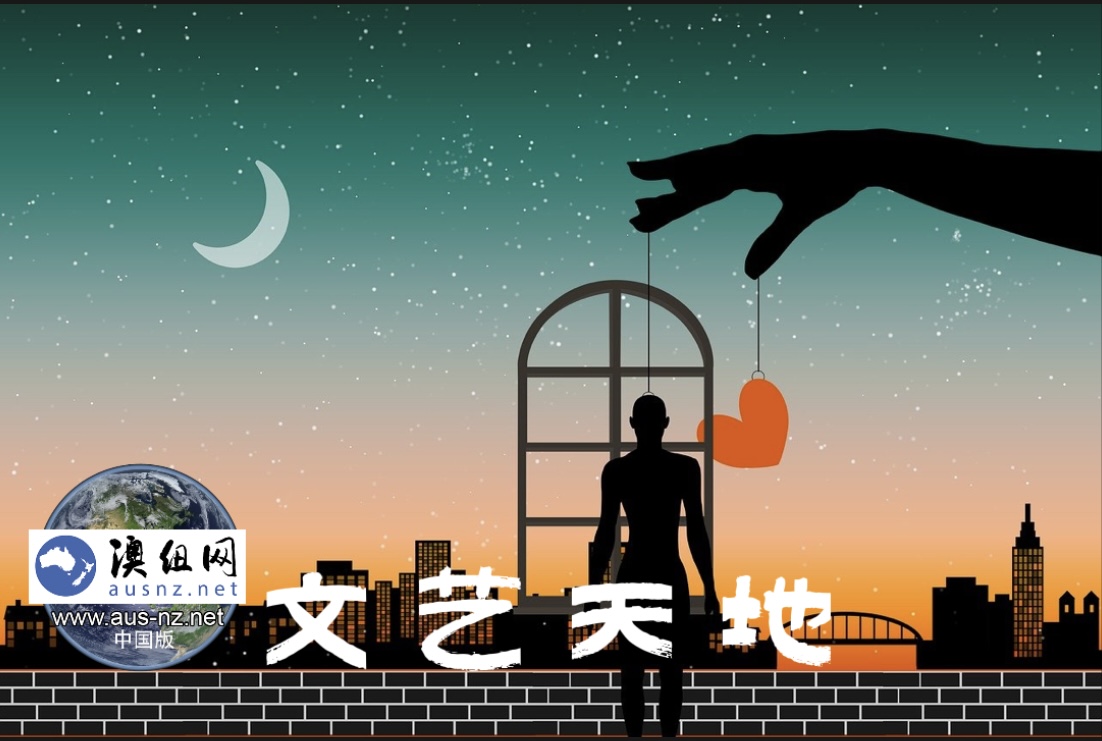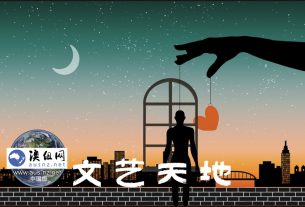Chinese Poet Cao Shui Attended the 22nd Homer International Poetry Festival in Turkiye
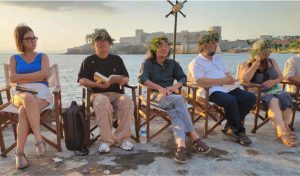
From August 1 to 10, Chinese famous poet Cao Shui was invited to participate in the 22nd Homer International Poetry Festival in Türkiye, which was also the first time that Chinese poets were invited to participate. Many Turkish media reported that “Homer Poetry Festival welcomes Chinese poets for the first time”. Cao Shui first visited the ancient city of Istanbul, and then went to Bozcaada from the 4th to the 6th to participate in the Homer Poetry Festival. He recited Homer’s epic poem “Iliad” in Chinese for the first time, attended the Forum on Eastern and Western Civilizations, delivered a speech on “The Future of the World: Multicentricism of Eastern and Western Civilizations”, and visited the ancient city of Troy where “Iliad” took place. During this period, Cao Shui also participated in the premiere of his Turkish poetry collection Listening to the Heartbeat of the World in Istanbul, and awarded the medal of the Great Poetry Movement to Mr. Haluk Sahin, Director of Homer International Poetry Festival.
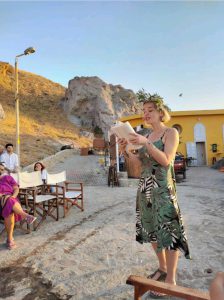
On the morning of August 6th, with the eastern light shining, the sun was still lurking beneath the horizon. Poets from around the world wore ancient laurel crown woven by olive branches, leaning against the sea and castle, waiting for the sun to rise. When the sun rose, Chinese poet Cao Shui and British Chinese poet Yang Lian recited the first two stanzas of Homer’s epic Iliad, and then poets from other countries repeated the first two stanzas in Turkish, English, German, Greek, Albanian, etc. Poets recited the Iliad in a circular manner, reliving the great significance of Homer’s epic, one of the origins of human literature, in this place where the Trojan War occurred. After the meeting, Cao Shui, on behalf of Chinese poets, presented the Chinese version of “Iliad” to Mr. Harouk Sashin, the chairman of the poetry festival. He said, “This is the first time Chinese poets have been welcomed to the festival, and it is also the first time we have received the Chinese version of” Iliad “. We will permanently preserve it in the library.”
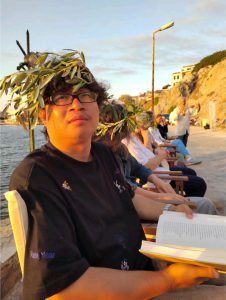
Poets from around the world discuss the significance of Homer’s epics. Homer’s epics include the Iliad and the Odyssey, which are said to have been written by the blind poet Homer. The entire poem of the Iliad consists of 15693 lines and is divided into 24 volumes, mainly describing the Trojan War. Under the leadership of the “King of the People” Agamemnon, a Greek coalition consisting of soldiers and fleets from various regions experienced setbacks and landed on the coast of Troy. However, during the first nine years of the war, the war remained stagnant without any progress. In the tenth year, Agamemnon suffered damage to the Greek coalition due to his own decision-making mistakes, and had a dispute with the leaders of the Greek federations, including Achilles, who came to persuade him. In a fierce argument, Agamemnon decided to take back all the spoils of Achilles, including his female companion, which led to Achilles being humiliated and angry, and he refused to go to war. The Trojans, under the leadership of their leader Hector, who wore a shining bronze helmet, continued to achieve victory, even reaching the naval defenses and strongholds of the Greek coalition, burning their ships, and about to drive the Greek coalition back to the sea. After Hector killed Achilles’ friend Patroclus in the battle, Achilles was furious and finally decided to go into battle. After returning to the battlefield, he resisted the Trojan attack and killed Hector, while Achilles also died in battle. The Homer Epic is one of the most important spiritual treasures of ancient Greece and an indispensable part of the source of Western civilization. As a heavyweight narrative epic, “Iliad” holds a pivotal position in the history of world literature, and its narrative methods have had a significant impact on later European and world literature.
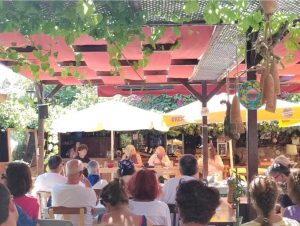
After lunch, the poets participated in the “Exchange of Eastern and Western Civilizations” forum, chaired by the chairman of the Poetry Festival, Mr. Haluk Sahin, to elaborate on the significance of the exchange of Eastern and Western civilizations. Cao Shui delivered a brief speech on “The Future of the World: Multicentricism of Eastern and Western Civilizations”, Cao Shui said, “Three thousand years ago, Greek world was divided into hundreds of city states, which were later unified by Alexander the Great as the Greek world. Three thousand years ago, China was also in the Warring States period, where hundreds of feudal states fought, and later unified by Qin Shi Huang as the Great China Empire. Today, we have more than 200 countries, consisting of over 2000 ethnic groups. I believe that in the next 500 years, we will definitely become a unified and diverse new world. Poets from all over the world express their opinions and engage in debates. Finally, Cao summarized and said, “When I was a child, my second brother Cao Chunbo once gave me a painted version of the Bible. The story of the Tower of Babel mentioned above is unforgettable to me for a long time. Humans want to build a Tower of Babel that leads to heaven, gathering from all over the world. God, afraid of violating his own authority, has disrupted human language. People cannot build the Tower of Babel because they cannot communicate, thus forming two thousand ethnic groups around the world. Although it is a punishment to human beings from the perspective of God, I had a dream when I was young, that is, to build the Tower of Babel in culture so that brothers and sisters from all over the world can communicate freely. I think one of the ways is translation. Since Goethe proposed the concept of world literature in 1827, world literature has become the dream of many excellent writers. I also hope to work with all writers who share a common dream through my own creation in the future to establish a common tower of world literature for mankind.”

Cao Shui arrived on Bozcaada Island after visiting the Hagia Sophia, Blue Mosque, Topkapi Palace, and Yerebatan in the ancient city of Istanbul. Bozcaada is the ambush of the Greek coalition in the Trojan horse plot depicted in Homer’s epic poem “Iliad”, facing the ancient city of Troy. Therefore, Haluk Sahin held the first Homer International Poetry Festival in 2002. On Bozcaada Island, there is also an ancient castle, and the residents of the small town welcome poets from all over the world as if celebrating a festival. Turkish poets also led poets from all over the world to visit the ancient castle, swim in the bay where the Greek allied forces ambushed, and visit the quiet town.
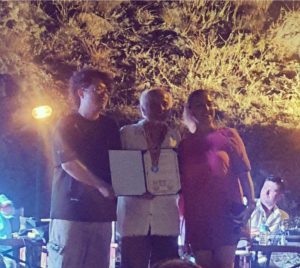
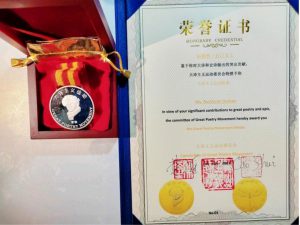
On October 5th, the Homer Poetry Festival held a poet recitation and signing ceremony. At the meeting, the Great Poetry Movement Committee was first represented by Cao Shui and Nurduran Duman to present the Great Poetry Movement Medal to Haluk Sahin, the Director of the Homer Poetry Festival. In view of his contributions to great poetry and epic, the Grand Poetic Movement Medal was specially awarded to him. Cao Shui and Nurduran presented the medals and certificates to him on site. The Great Poetry Medal is made of pure silver, with a diameter of 70mm, a thickness of 3.4mm, a weight of 70g, and made in Yongxing, the silver capital of China. From design to casting, it was created by famous artists. The portrait was taken by the famous photographer Song Zuifa, the medal was designed by the famous sculptor Zhang Guoliang, and the seal was carved by the famous calligrapher Gu Mingchuan; On the front is a portrait of Cao Shui, the initiator of the Great Poetry Movement, written in both Chinese and English: GREAT POETRY MOVEMENT; On the back is an ancient map of Asia, Europe, and Africa in clover’s shape, annotated with ASIA, EUROPE, and AFRICA in English. The map was drawn by German geographer Heinrich B ü ting in 1581 and represents the known ancient world at that time. Here, it symbolizes the common home of humanity, and the core idea of the Great Poetic Movement is carved around it, which is “integrating ancient and modern cultures, integrating Western and Eastern cultures, integrating sacred and secular cultures”. The Great Poetry Movement began in 2007 when Cao Shui wrote the “Manifesto of the Great Poetry Movement” and has now spread to major languages around the world. Starting from this year, the Committee of the Great Poetic Movement will select two international poets who have made outstanding contributions to great poetry and epic each year, and Haluk was the second poet to receive the medal.
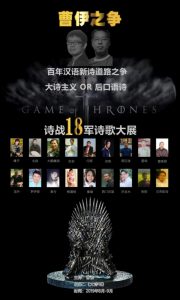
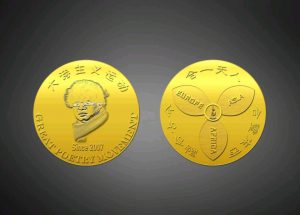
Great Poeticism or Great Poetry Movement is a poetic trend in the Chinese poetry world in the 21st century. Great poetry can be traced back to epic poetry. It was proposed by Chinese poet Hai Zi in the 1980s, and in 2007, poet Cao Shui wrote the “Manifesto of Great Poeticism” and jointly launched the Great Poetry Movement with poets such as Xi Yuan and Xi Di. They advocats the extraction of elements from various civilizations, integrating sacred and secular cultures, integrating Eastern and Western cultures, integrating ancient and modern cultures, to creat a brand new world of imagery. He founded the magazine “Grand Poetry-Literary Perspective”. Great Poetry Movement was listed as one of the 20 avant-garde poetic schools in China. In “Dancing on the Pen Tip: A Witness to the Literature of the 80s” (formerly known as “History of Literature of the 80s”) edited by Xu Duoyu, have been introduced in a special chapter in the “Literary Theory” volume. Along with Statism and Sensory Writing, they are known as the three major literary trends initiated by the post-80s Chinese writers. Representative poets include Zhuang Ling, Han Bing, Lei Xun, Shen Jia, Shen Xue, Ye Mo, Shu Xian, Ying Zi, Su Ming, Yue Jian, Peng Shujin, Yin Zixu, Xu Yanmu, Guo Liangzhong, Shan Yuyang, Nuobu Langjie and many other post-80s and post-90s poets. In 2018-2020, Cao Shui, who represented the “Great Poetry Movement” and Yi Sha’s “Post-Colloquial Poetry School”, engaged in a three-year debate, which was referred to as the “Cao-Yi Dispute” in the poetry world. In the first issue of “Literary Freedom Talk” in 2023, Cao Shui, who wrote an article titled “Cao-Yi Dispute and the Ten Major Disadvantages of the Chinese Literary World” in the form of a cover poet, summarized that the “Cao-Yi Dispute” erupted one hundred years after Hu Shi wrote the “Trial Collection”,which is the first poetry collection published in mordern Chinese, which was probably caused by a series of factors, At that time, many people interpreted it as the “debate over the century long path of Chinese new poetry”, believing it to be the biggest controversy in the Chinese poetry world since the “Panfeng Dspute”(The Debate between Intellectuals Poets and Folk Poets in Chinese History) and the “most modern controversy of the 21st century”. The core of this debate is the issue of the direction of Chinese new poetry, whether it is the “Post-Colloquial Poetry” advocated by Yi Sha, the “Great Poetry” advocated by Cao Shu. During this process, He was able to discern the various strange current situations in the literary world, and literature called for an in-depth “literary reform movement”. Since 2017, With Cao Shui joining the World Poetry Movement, it has been spread to various countries around the world.
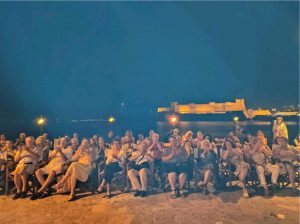
At the recitation, Cao Shui recited his three poems “The Great Dance of Sorrow”, “Listening to the Heartbeat of the World in Istanbul”, and “I Always See My Mother as a Twelve-Year-Old Girl”. The last poem brought tears to the readers and residents present.
Mother came to Beijing to see her grandson Cao Eurofrasia
I show her Qianmen and Tian’anmen
I took her to Houhai and Shichahai
She didn’t say anything
Every time we meet a clothing store
She’s going to have to look at it carefully
Mother is like all women
Like beautiful clothes
But I never knew
It was as if I had seen my mother
What a twelve-year-old girl looked like
She runs in the mountains and flowers
She rejoiced in a new dress
Mother’s mother died that year
From then on, she no longer dared to like clothes
She brought up my little uncle
She bring Cao Shui up
She brought Cao Xi up
Let us go to school with the money for clothes
Cao Xi became a doctor of the Chinese Academy of Sciences
Cao Shui Became a Master of Peking Normal University
Mother was relieved at last
She picked clothes there
But I can’t help crying
I always see my mother as a twelve-year-old girl
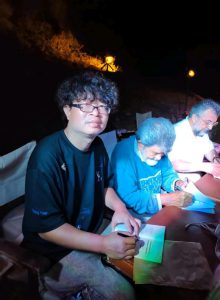
After the recitation, a signing meeting was held. Cao Shui signed his poetry collection with two famous Turkish poets, Cevat Capan and Fatin Hazinedar. Local residents queued up to buy Listening to the Heartbeat of the World in Istanbul. Many people said they were moved to tears by Cao Shui’s poem about his mother. They also suggested Cao Shui buy some Türkiye clothes for his mother to take home.
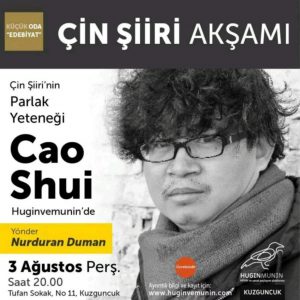
Cao Shui is one of the representative poets of the post-80s generation in China. In recent years, he has participated in a series of international activities, such as the Medellin International Poetry Festival, the Krisya International Poetry Festival in India, the Havana International Poetry Festival in Cuba, and the International Writing Plan of the China Writers Association. His works have been translated into more than 30 languages, including English, French, Russian, Indian, Polish, Danish, Italian, Spanish, and Turkish, etc. There are more than 30 famous poets writing comments in the international poetry world, renowned as a representative poet of the “young generation leading the new world” by the outstanding Indian poet Ratti Saxena. He also translated three books, including “The Song of the Dreamland”. He is a poet with international reputation and is known as the “International Cao” in the poetry world. He writes poetry, novels, fairy tales, as well as film and TV series scripts. He has published more than 40 books, including poetry collections such as “The Epic of the Eurasian Continent”, novels such as “The Secret History of Kunlun”, literature collections such as “The Animal Kingdom of Kekexili”, fairy tales such as “The Princess Snow Leopard”and created over 100 film and television scripts such as “The Peacock King”. He also founded the Great Poetry School, initiated the “Cao-Yi Controversy” in the literary world, advocated for the DramatizeNovel Movement, and the Film Poetry Movement, which had a wide influence in the literary world. In recent years, Cao Shui has won more than 50 literary and artistic awards at home and abroad, including the First Chinese Young Poet Award, the 7th Chinese Long Poetry Award, the “Literary Star” of the 5th Qinghai Youth Literature Award, the 4th Cao Yu Cup Script Award, the Apolo Dionysus Poetry Award of the 8th Rome Contemporary International Academy of Poetry and Art Award, and the 2021 Russian Golden Knight Award. His works have gained dual recognition from the literary world and the market. He is considered one of the representative writers of the post-80s generation in China.
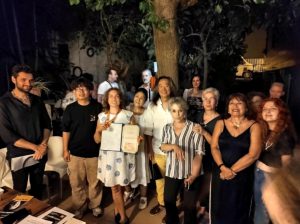
Previously, Cao Shui held the premiere of Turkish poetry collection Listening to the Heartbeat of the World in Istanbul. The inaugural ceremony was held at the Hygiene Munich Gallery in Istanbul, presided over by the translator of the book and the famous Turkish poet Nurduran Duman. Cao Shui delivered a speech titled “From China to Rome, We Must Pass through Istanbul”. Cao Shui recited his five works on the spot, answered readers’ questions, and finally held a signing meeting.
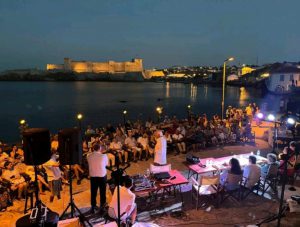
After the Poetry Festival, the director of Homer Poetry Festival, Haluk Sahin, and the local residents sent off the poets to leave. His wife, Turkish sculptor Belgin Sahin, danced a unique farewell dance on the shore. Afterwards, poets visited the ancient city of Troy on the other side, which was the birthplace of Homer’s epic Iliad and one of the origins of Western literature. The poet Nurduran Duman took the poets to visit their hometown, the ancient city of Canakkale, which, like Istanbul, controls the Turkish Strait from south to north. The 22nd Homer International Poetry Festival has been successfully completed, and the director of the festival, Haluk Sahin, proudly said, “From then on, Homer can also speak Chinese”.(end)

![]()
新西兰 澳纽网出品
编辑:小图

广告 | Advertisement
在澳纽网做广告 | Advertise with us
720 views


